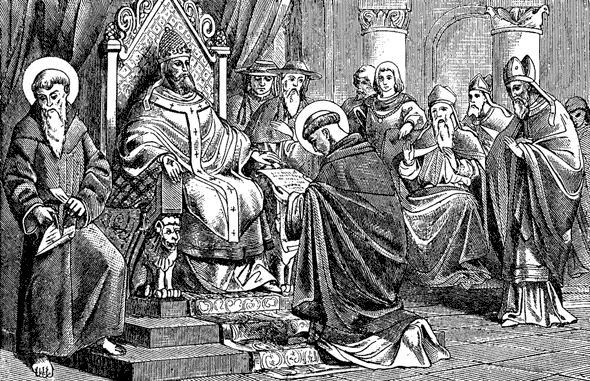It was 1264 when Pope Urban IV instituted the Feast of Corpus Christi, (this title comes from the Latin, meaning the Body of Christ). The pope wanted a special Mass and office written especially for this new important feast of the Holy Eucharist. It was this difficult and essential task that was appointed to both Sts. Bonaventure and Thomas Aquinas. The holy father reserved to himself the right of choosing which of these two great men’s writings would be used.
So on the appointed day, both Saints, each with his manuscript under his arm, came before the Vicar of Christ. St. Thomas was to go first, and kneeling before the pope, began to read what he had written. Both Pope Urban IV and St. Bonaventure listened with tears of emotion to the beautiful work of this Saint. And while St. Thomas was still reading, St. Bonaventure turned aside and tore his manuscript into small pieces. When St. Bonaventure's turn came, he admitted what he had done and told them that he was no longer in possession of his manuscript. St. Bonaventure explained that he considered St. Thomas’ work alone worthy to be used at the Most Holy Feast, therefore making it unnecessary to take his own poor work into account.
And for centuries now on the feast of Corpus Christi, within every Catholic church is heard that heavenly hymn written by the hand of St. Thomas Aquinas. And while no one will ever know what inspiring prayer St. Bonaventure wrote, we do know one thing. While God is greatly glorified and pleased with the great work of St. Thomas Aquinas, He is equally glorified and pleased with the great humility of St. Bonaventure.
So when you hear the "Tantum Ergo" or the "O Salutaris Hostia," (excerpts from what St. Thomas wrote for the feast of Corpus Christi), remember the humble act performed by St. Bonaventure who desired that this feast be the most beneficial to the Catholic Church and give the greatest glory to God.
